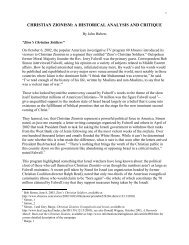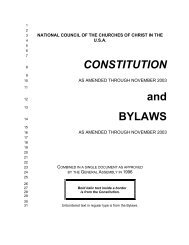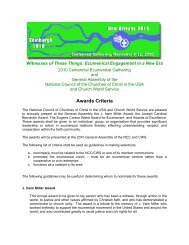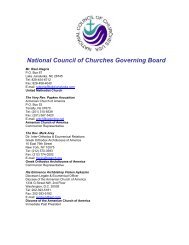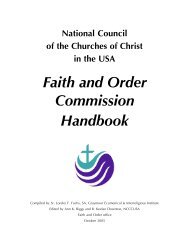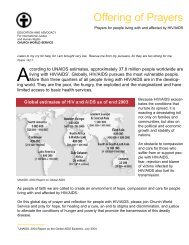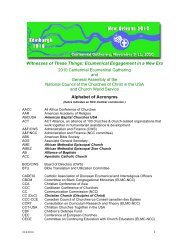Common Agreement on Mutual Recognition of Baptism - National ...
Common Agreement on Mutual Recognition of Baptism - National ...
Common Agreement on Mutual Recognition of Baptism - National ...
Create successful ePaper yourself
Turn your PDF publications into a flip-book with our unique Google optimized e-Paper software.
226<br />
227<br />
228<br />
229<br />
230<br />
231<br />
232<br />
233<br />
234<br />
235<br />
236<br />
237<br />
238<br />
239<br />
240<br />
241<br />
242<br />
243<br />
244<br />
245<br />
246<br />
247<br />
248<br />
249<br />
250<br />
251<br />
252<br />
253<br />
254<br />
255<br />
256<br />
257<br />
258<br />
259<br />
260<br />
261<br />
262<br />
263<br />
264<br />
265<br />
266<br />
267<br />
8. Given our mutual recogniti<strong>on</strong> <strong>of</strong> <strong>Baptism</strong>, we encourage using baptismal registers in the<br />
local church community and, when requested by another church for a pastoral need in the<br />
life <strong>of</strong> an individual, providing written attestati<strong>on</strong>s <strong>of</strong> <strong>Baptism</strong>, including the liturgical<br />
formula used. Such cooperati<strong>on</strong> and mutual accountability h<strong>on</strong>ors the dignity <strong>of</strong> the<br />
sacrament <strong>of</strong> <strong>Baptism</strong>.<br />
We rejoice at the comm<strong>on</strong> faith we share and affirm in this document. We understand that the<br />
journey toward full, visible unity depends <strong>on</strong> openness to the grace <strong>of</strong> God and humility before<br />
the initiatives <strong>of</strong> God‘s Spirit am<strong>on</strong>g us. Because <strong>of</strong> these c<strong>on</strong>victi<strong>on</strong>s, we encourage Roman<br />
Catholic and Reformed pastoral leaders to c<strong>on</strong>tinue their commitment to regular dialogue about<br />
theology and pastoral practice from local to internati<strong>on</strong>al settings. Pastoral leaders engaged in<br />
such dialogue embody our hopes for unity, collaborative effort, and comm<strong>on</strong> witness. We<br />
believe that respectful dialogue can provide a str<strong>on</strong>g witness to the wider church about our<br />
commitment to a relati<strong>on</strong>ship in Christ and can stand as a safeguard against the unreflective<br />
judgments that have, at certain times in our history, diminished and distorted our relati<strong>on</strong>s.<br />
3. Historical Overview: Perspectives <strong>on</strong> Sacramentality<br />
The following secti<strong>on</strong>s describe both the history and theology <strong>of</strong> baptismal rites in the Reformed<br />
and Roman Catholic communi<strong>on</strong>s. Two different investigatory methods are evident in the work<br />
that follows: (1) an historical approach (especially Secti<strong>on</strong> II), narrating each communi<strong>on</strong>‘s self<br />
understanding relative to sacramental practice, as developed over a given timeline, and (2) a<br />
liturgical approach (especially Secti<strong>on</strong> IIIA) that <strong>of</strong>fers each communi<strong>on</strong>‘s own account <strong>of</strong> the<br />
Church‘s interacti<strong>on</strong> with God in the celebrati<strong>on</strong> <strong>of</strong> the rites themselves. The observati<strong>on</strong>s which<br />
follow are made <strong>on</strong>ly <strong>of</strong> Roman Catholic and not <strong>of</strong> Eastern Christian baptismal rites.‖<br />
The following secti<strong>on</strong>s describe both the history and theology <strong>of</strong> baptismal rites in the Reformed<br />
and Roman Catholic communi<strong>on</strong>s. Two different investigatory methods are evident in the work<br />
that follows: (1) an historical approach (especially Secti<strong>on</strong> II), narrating each communi<strong>on</strong>‘s self<br />
understanding relative to sacramental practice, as developed over a given timeline, and (2) a<br />
liturgical approach (especially Secti<strong>on</strong> III) that <strong>of</strong>fers each communi<strong>on</strong>‘s own account <strong>of</strong> the<br />
Church‘s interacti<strong>on</strong> with God in the celebrati<strong>on</strong> <strong>of</strong> the rites themselves. The observati<strong>on</strong>s which<br />
follow are made <strong>on</strong>ly <strong>of</strong> Roman Catholic and not <strong>of</strong> Eastern baptismal rites.<br />
Historical Introducti<strong>on</strong><br />
The Reformed and Catholic communi<strong>on</strong>s share a comm<strong>on</strong> traditi<strong>on</strong> about sacrament.<br />
They rejoice over what they uphold together and they understand where they evaluate the<br />
traditi<strong>on</strong> differently. Their comm<strong>on</strong> traditi<strong>on</strong> begins with the apostle Paul and the Greek word<br />
mysteri<strong>on</strong> (―mystery‖) as found in Paul‘s letters (e.g., 1 Cor. 2:1; 4:1; Rom 16:25). There the<br />
word referred to God‘s hidden plan for salvati<strong>on</strong>. The developing Pauline traditi<strong>on</strong> (e.g., Eph.<br />
1:9; 3:3, 4, 9; Col. 1:26-27; 2:2) took up this theme and proclaimed that this ―mystery‖ is<br />
embodied in Christ, in whose sufferings we share (e.g., Col. 1:24-2:3). 1 From there, early North<br />
1 See, for example, Günther Bornkamm, Mysteri<strong>on</strong>, in Gerhard Kittel, ed. Theological Dicti<strong>on</strong>ary <strong>of</strong> the New<br />
Testament, trans. and ed. Ge<strong>of</strong>frey W. Bromiley, Vol. IV (Grand Rapids, MI: Eerdmans Publishing Company, 1967)<br />
803ff.<br />
6



